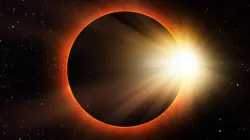Lunar Eclipse 2024: When and where to watch Chandra Grahan, is it visible in India?
Know the key details for Lunar Eclipses in 2024, including precise dates, visibility, and optimal viewing locations. Find out if the Chandra Grahan is observable in India and how to experience this celestial event.

Lunar eclipses are mesmerizing celestial events that capture the imagination of skywatchers around the world. Get ready for another breathtaking celestial spectacle this month! On September 18, 2024, the world will witness the second lunar eclipse of the year, commonly referred to as Chandra Grahan. Although visible in various parts of the globe, India will miss out on viewing the partial lunar eclipse since the Moon will be below the horizon at the time. Despite being invisible from India, this astronomical event holds significant spiritual importance for many across the nation.
Here's a guide to when and where you can watch the lunar eclipse:
Lunar Eclipse 2024: Timing
The lunar eclipse will take place on September 18, according to Indian Standard Time (IST). The timing with key phases is given below:
Penumbral Eclipse Begins: 06:11 AM
Partial Eclipse Begins: 07:42 AM
Maximum Eclipse: 08:14 AM
Partial Eclipse Ends: 08:45 AM
Penumbral Eclipse Ends: 10:17 AM
What happens when Chandra Grahan takes place?
During Chandra Grahan or lunar eclipse, the Earth positions itself between the Sun and Moon, casting a shadow on the lunar surface. This shadow can partially or completely cover the Moon, sometimes giving it a reddish tint. According to NASA, a partial lunar eclipse occurs when Earth's shadow grows and recedes without fully covering the Moon.
Places where Chandra Grahan will be visible
The partial lunar eclipse will be visible on 5 continents across the globe, including Europe, Africa, North and South America, and parts of Asia.
What is Sutak Period?
According to Hindu tradition, the Sutak period signifies an inauspicious timeframe preceding an eclipse, typically commencing 9 hours prior. Nonetheless, due to the September 18 lunar eclipse's daytime occurrence and invisibility from India, this period will not be observed.
Tips for viewing Lunar Eclipse
- Use Binoculars or a Telescope: While some eclipses can be seen with the naked eye, using binoculars or a telescope can enhance the viewing experience, especially for penumbral eclipses.
- Find a Dark Location: Light pollution can affect visibility. If possible, watch the eclipse from a location away from city lights.
- Check Local Timings: Eclipse timings can vary depending on your specific location within India. Checking a local astronomical calendar can help you determine the exact timing for your area.
ALSO READ: Lunar Eclipse 2024: Does Chandra Grahan effects your health? Check details
